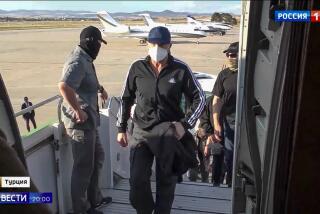A Russian horror story: Gang sentenced for 12 murders at family home
MOSCOW -- In a country that is no stranger to horrific crimes, this one stood out: On Nov. 4, 2010, someone killed 12 people -- Server Ametov, members of his family and several guests -- in the Krasnodar region of southern Russia, then tried to burn down their house with the bodies inside.
The investigation and criminal case that followed was equally remarkable, with its blend of killing, kidnapping, rape, illegal arms possession and political corruption.
The case came to an apparent end Tuesday with the sentencing of a flamboyant former lawmaker with the ruling party and members of a criminal organization known as the Tsapki gang to stiff prison terms.
The former local lawmaker, Sergei Tsapok, 39, was sentenced to life in prison for his role as the gang leader responsible for the massacre. Two other defendants got life sentences, and three got 19 or 20 years.
Tsapok’s mother, Nadezhda Tsapok, was sentenced last week to three years in prison for fraud. She was convicted of embezzling $500,000 in state funds with the help of her son.
Sergei Tsapok remained defiant at his sentencing. “I want to address all journalists present in the room: We will meet again,” Tsapok said. “I am not going to commit suicide ... if I am not killed, of course.”
In addition to those sentenced Tuesday, two gang members committed suicide while in prison. Another two were sentenced to long prison terms in a separate trial this year.
According to prosecutors, Tsapok’s gang operated from a farm in the town of Kushchevskaya since 1998, in effect controlling the town. Local police were on the gang’s payroll. Tsapok, meanwhile, was a prominent member of the the local branch of President Vladimir Putin’s United Russia party and a local lawmaker.
Gang members were able to concentrate all local business in their hands, authorities said, and dealt ruthlessly with anyone who opposed them. Gang members were accused of randomly kidnapping young women off the street, raping them and threatening them into silence.
They were suspected in 19 deaths over a decade, including the 12 at the Ametov home.
The Ametovs also ran a large farm in the area, and were at odds with Tsapok and his family. The Tsapoks suspected that the Ametovs were responsible for the death of Sergei Tsapok’s older brother, authorities said, although that was never proved.
In the aftermath of the Ametov killings, federal authorities in Moscow took over the case after determining that local police were incapable of conducting a fair investigation. After the police chief and senior officers were fired, dozens of witnesses stepped forward to testify against the Tsapoks.
Nationally, the Ametov killings became emblematic of the corruption that has sunk deep roots in Russian society, and which many now associate with the ruling party.
“The crimes in Kushchevskaya have become an epitome of corruption in the eyes of our citizens,” said Alexander Khinshtein, a United Russia lawmaker and a prominent corruption fighter. Still, he said in an interview, “our party and our leadership displayed its political will to expose and combat those and other crimes.”
But opposition leader Gennady Gudkov said United Russia has proved itself incapable of curbing corruption.
“The scale of corruption that flooded the country under Putin is so overwhelming that the authorities simply can’t pretend it doesn’t exist and do nothing,” Gudkov, a former officer of the Soviet KGB and its Russian successor, the FSB, said in an interview. “The Kremlin generates more corruption than it uproots.”
Even Putin felt the need to insist that he was doing what he could to combat.
“Regardless of position and party affiliation we will continue in the most serious way to uproot this virus,” Putin said in televised remarks last Thursday. “Let everyone bear this in mind.”
ALSO:
‘Selfie’: 2013’s word of the year
Iran official: Nuclear talks are ‘historic opportunity’ for change
U.S. leads Philippine disaster relief but most Americans unengaged
sergei.loiko@latimes.com
More to Read
Sign up for Essential California
The most important California stories and recommendations in your inbox every morning.
You may occasionally receive promotional content from the Los Angeles Times.










